Some afternoons there was an enormous platter of sweet yellow estate grown pineapples on the table at my grandparents’ Madikeri home. Most lunches ended with whatever fresh fruit was in season: Coorg mandarin oranges at their best, hefty red chonde bale, red bananas; diminutive puv bale or delicately tinted rose apples. Pineapples were a treat, and we stood around, grabbing slices, biting into them, sucking up all the juices, barely paying attention to the shouted admonitions not to eat the woody centers, as that would give us itchy throats. 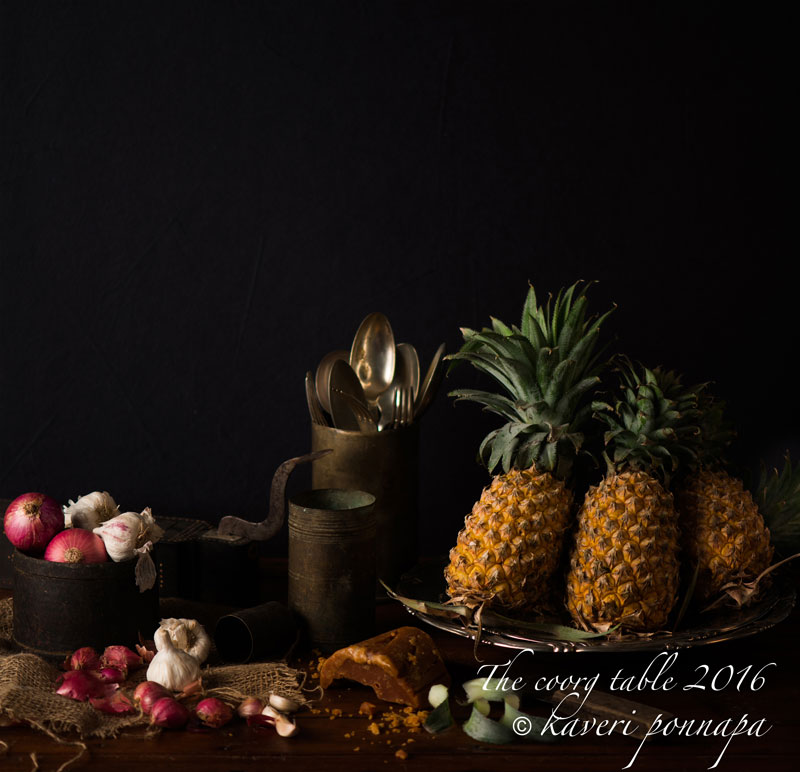 Pineapples, of course, like so many other fruits, vegetables and plants that are now naturalized, are not native to India or Coorg. Ananas comosus, from the Tupi Indian word meaning ‘excellent fruit’, travelled across the world from Brazil with the Portuguese. From modern markets we buy and consume imported fruits without a thought, without hesitation or suspicion, and it often feels that some of the wonder and excitement of the unknown has gone out of our lives. But when the pineapple arrived in Coorg, it must have been regarded as a strange, exotic fruit – did it take some time before people began to eat it regularly?
Pineapples, of course, like so many other fruits, vegetables and plants that are now naturalized, are not native to India or Coorg. Ananas comosus, from the Tupi Indian word meaning ‘excellent fruit’, travelled across the world from Brazil with the Portuguese. From modern markets we buy and consume imported fruits without a thought, without hesitation or suspicion, and it often feels that some of the wonder and excitement of the unknown has gone out of our lives. But when the pineapple arrived in Coorg, it must have been regarded as a strange, exotic fruit – did it take some time before people began to eat it regularly? 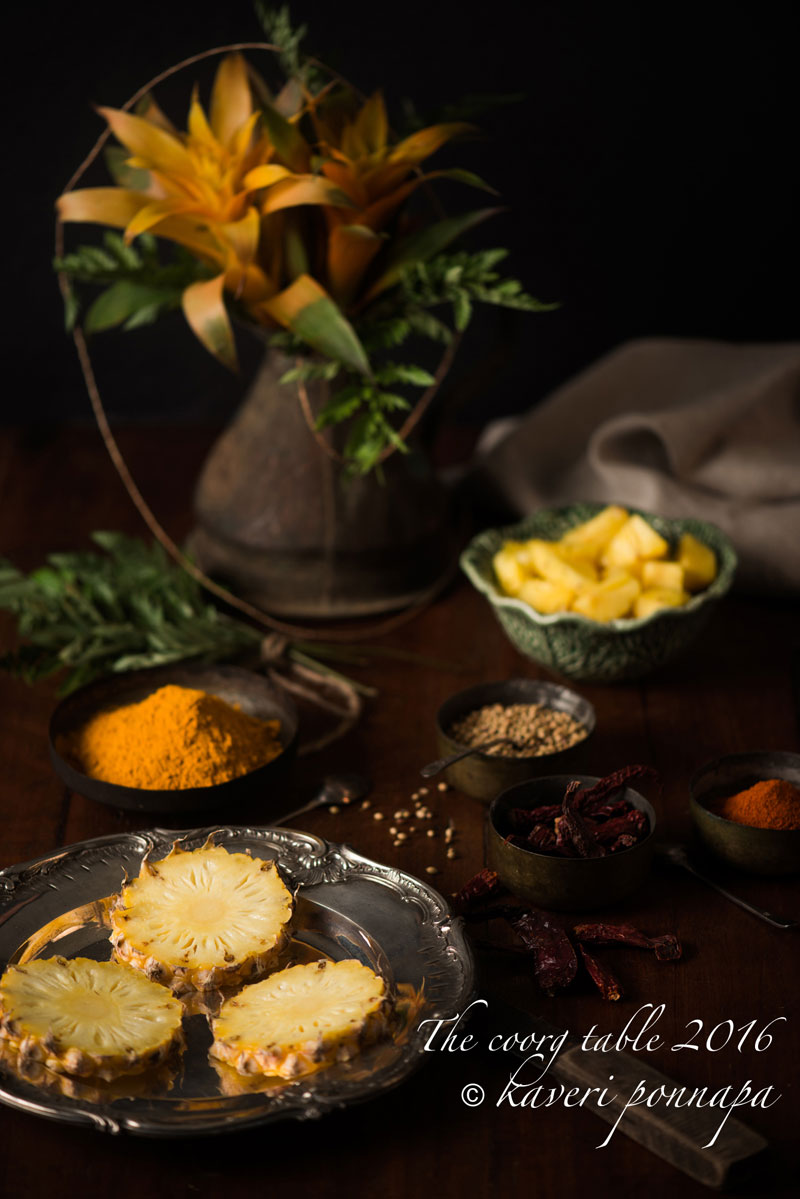 I try to imagine what people in remote ancestral homes in Coorg would have thought of the first pineapple that made its way into their world. The simplest possible way to deconstruct the unfamiliar fruit may have been to compare it with something they knew well, and grew in abundance around them – the jackfruit. Similar spiky skins, sweet scented, succulent golden yellow flesh and nuanced flavours. So it isn’t surprising that they called the new fruit ‘parangi or paringe chekke’, ‘firangi jackfruit. A little further south, in Kerala, they were more specific and named the fruit ‘poruthi chakka’, Portuguese jackfruit, after the navigators and sailors who brought the pineapple to their shores from the other end of the world.
I try to imagine what people in remote ancestral homes in Coorg would have thought of the first pineapple that made its way into their world. The simplest possible way to deconstruct the unfamiliar fruit may have been to compare it with something they knew well, and grew in abundance around them – the jackfruit. Similar spiky skins, sweet scented, succulent golden yellow flesh and nuanced flavours. So it isn’t surprising that they called the new fruit ‘parangi or paringe chekke’, ‘firangi jackfruit. A little further south, in Kerala, they were more specific and named the fruit ‘poruthi chakka’, Portuguese jackfruit, after the navigators and sailors who brought the pineapple to their shores from the other end of the world. 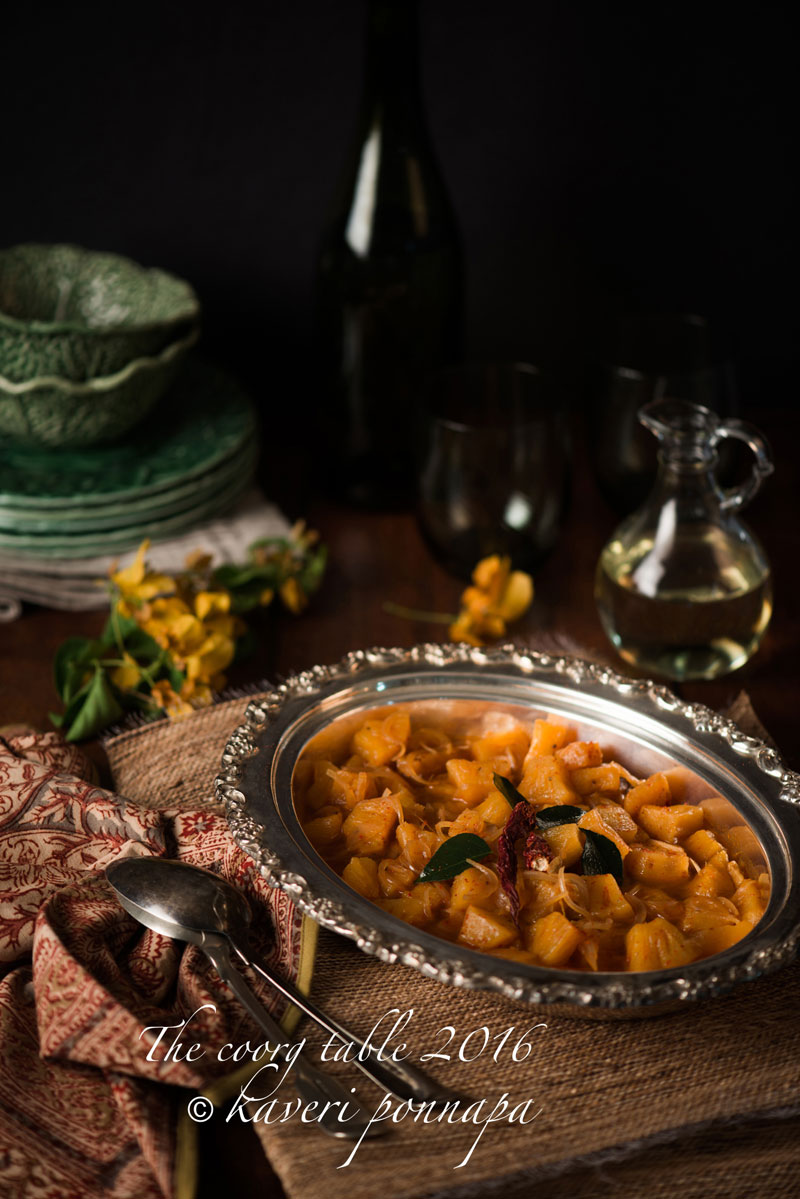 The Mughal emperors favoured this delicious fruit. It was served at the tables of the Emperors Akbar and Jahangir and it was quickly introduced into the Royal orchards and plantations. The fruit evoked similar associations there too, and Akbar’s historian Abul Fazal wrote that it was also known as kathal-i-safari, the travel jackfruit. Whatever the name, everyone agreed with the Brazilian Tupi Indians that it was a most “excellent fruit”; and what our grandmothers discovered is that it made the most excellent Coorg style curry.
The Mughal emperors favoured this delicious fruit. It was served at the tables of the Emperors Akbar and Jahangir and it was quickly introduced into the Royal orchards and plantations. The fruit evoked similar associations there too, and Akbar’s historian Abul Fazal wrote that it was also known as kathal-i-safari, the travel jackfruit. Whatever the name, everyone agreed with the Brazilian Tupi Indians that it was a most “excellent fruit”; and what our grandmothers discovered is that it made the most excellent Coorg style curry. 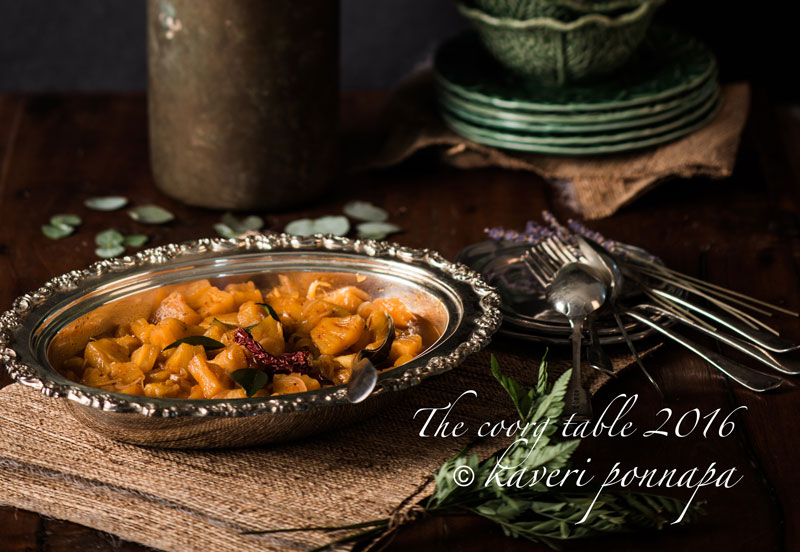
There are so many pleasures in cooking a pineapple. I love to admire its strange, golden armour plated symmetry and pale green crown, hold it up to my face and inhale the sweet fragrance that filters through that spiky skin. The firm rings are easy to slice into wedges or cubes once the thick skin has been sliced away. The cubes release generous juices when cooked, juices that blend beautifully with a few roasted and ground spices. A short simmer, and you have a bowlful of rich, nectar sweet curry highlighted with red spice, and chunks of pineapple that still retain the natural crunch and tanginess of the ripe fruit. If you are feeling adventurous, you could include more of that other ‘firangi’, a favourite of Coorg home cooks: dried bird’s eye chillies, known locally as paringe mollu.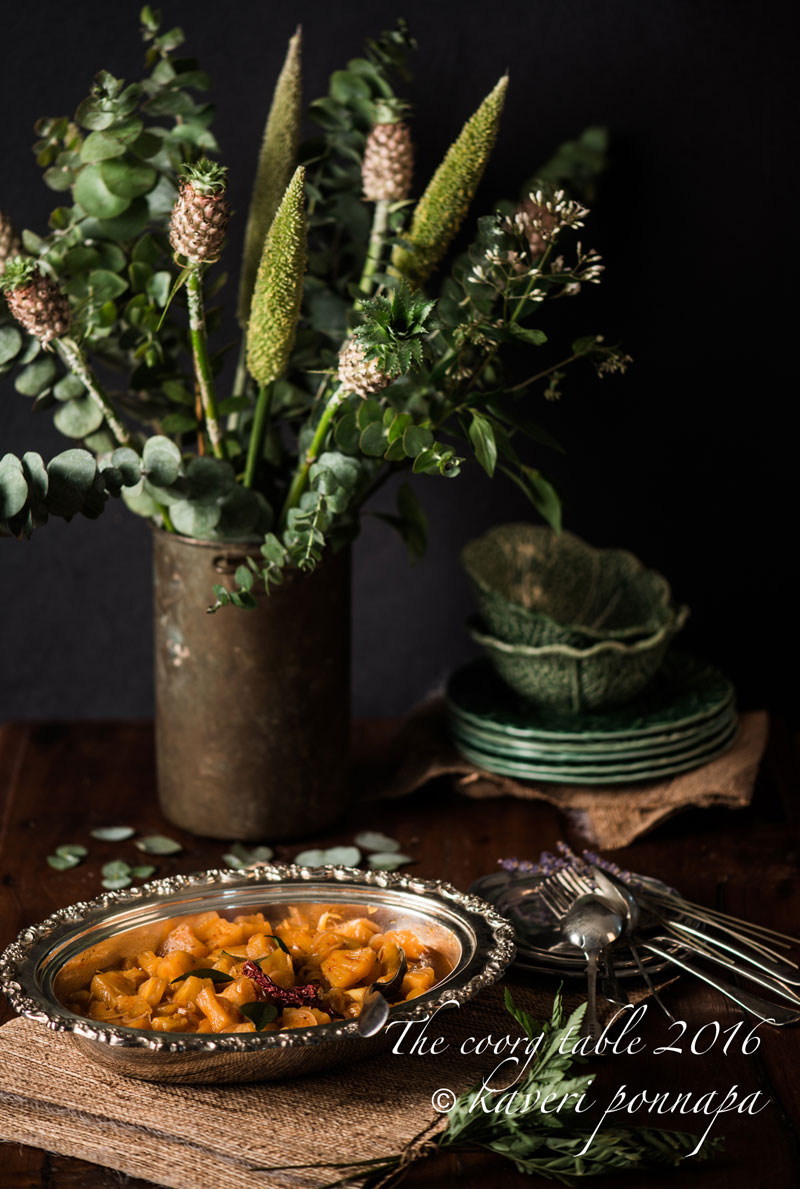 This is a curry of intense flavours and I prefer to eat it with soft cooked white rice and nothing else to distract me, mashing the cubes of pineapple and the juices into the rice, savouring the many complex, confusing and harmonious flavours in every mouthful. On a table crowded with other dishes, it works beautifully in smaller quantities as a relish. Edward Terry, Chaplain to Sir Thomas Roe, Ambassador to the court of the Emperor Jahangir was part of the first wave of trading Englishmen who came to India and settled in, many of them taking on Indian dress, food and many local customs and practices. They were considered to have ‘gone native’ by their countrymen in England. Terry wrote this vivid description of eating a pineapple and tasting: “strawberries, claret-wine, rose-water and sugar, well-tempered together”. Add to this the citrus notes of coriander seeds, the fire of bird’s eye chillies, a dash of jaggery and toasted cumin in an earthen curry chatti placed on a wood fire in Coorg, and you have a foreign fruit that’s gone completely native, with delightful results.
This is a curry of intense flavours and I prefer to eat it with soft cooked white rice and nothing else to distract me, mashing the cubes of pineapple and the juices into the rice, savouring the many complex, confusing and harmonious flavours in every mouthful. On a table crowded with other dishes, it works beautifully in smaller quantities as a relish. Edward Terry, Chaplain to Sir Thomas Roe, Ambassador to the court of the Emperor Jahangir was part of the first wave of trading Englishmen who came to India and settled in, many of them taking on Indian dress, food and many local customs and practices. They were considered to have ‘gone native’ by their countrymen in England. Terry wrote this vivid description of eating a pineapple and tasting: “strawberries, claret-wine, rose-water and sugar, well-tempered together”. Add to this the citrus notes of coriander seeds, the fire of bird’s eye chillies, a dash of jaggery and toasted cumin in an earthen curry chatti placed on a wood fire in Coorg, and you have a foreign fruit that’s gone completely native, with delightful results.
Photo Credits: Nithin Sagi
All Food Styling: Kaveri Ponnapa
Thank you for visiting this page. If you read something that you enjoy, or see an image that you like, please take a moment to write a response. Do look out for the recipes of all the food featured here in my upcoming cookbook.
ALL MATERIAL ON THIS WEBSITE IS COPYRIGHTED: If you wish to use any of tHIS material, KINDLY WRITE TO THE AUTHOR FOR PERMISSION.

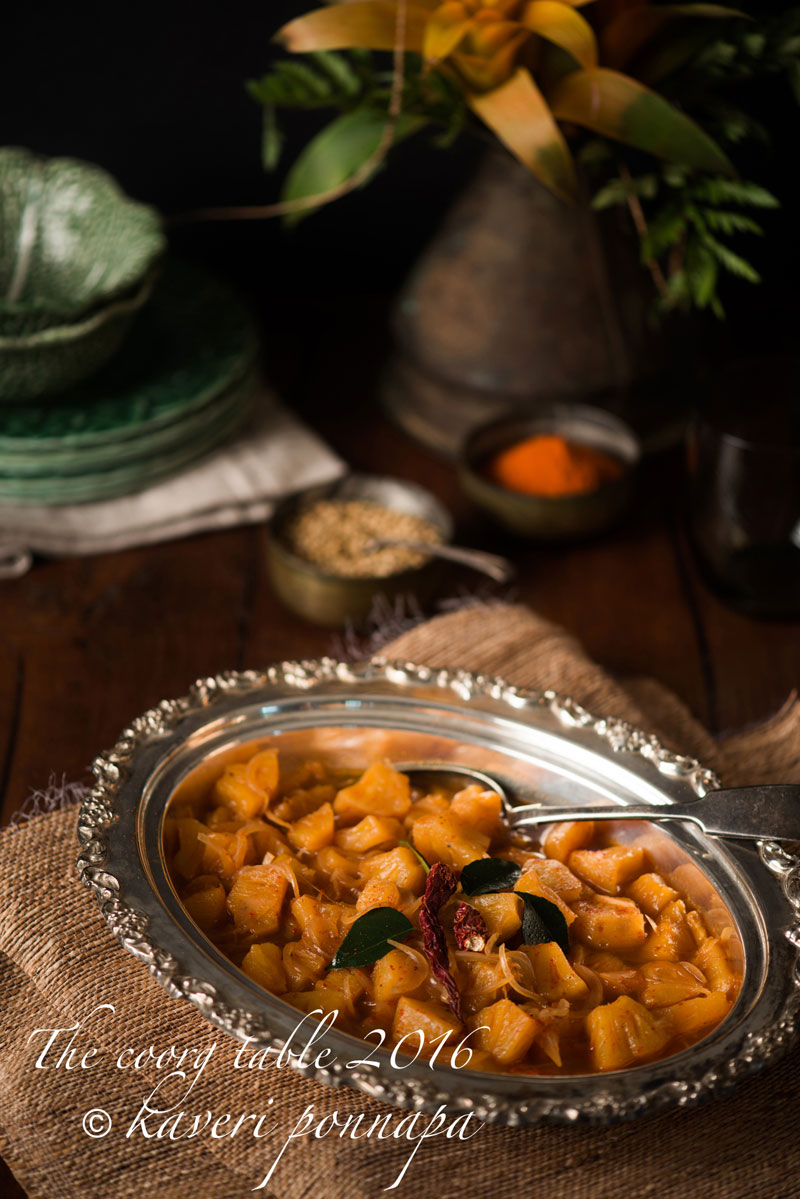
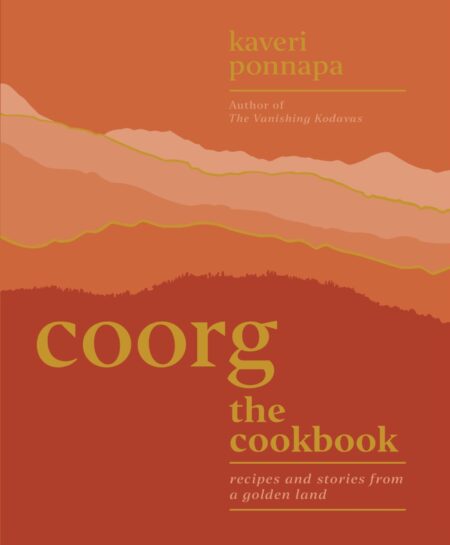
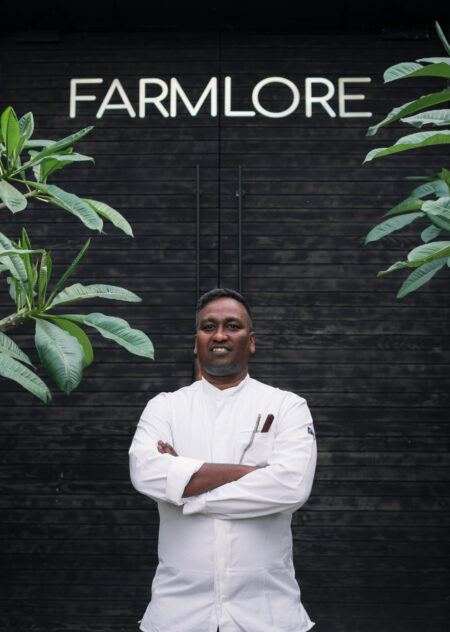

Beautifully presented !
Another recipe I will certainly try.
The book written by Edward Terry ‘A Voyage to East India’ is available on Google Archives.: https://archive.org/details/avoyagetoeastin00terrgoog
Hi Kishore, I’m so happy that you enjoyed this post. Thank you for the share, I often wish that I could include more history, but then the posts would become too long. Do keep reading these pages, and tell me if you try out any dishes. warm wishes.Kaveri
Radhika now you leave us in suspense waiting for the book to get the recipe :-). You have such beautiful way of describing any story you are writing about… Like a magic carpet I get transported into the story.
It’s worth the wait for all the recipes, I promise. There is so much that will be shared in the book, much more than I can ever post here, so I hope the wait will be worth it. Thank you very much for stopping by and taking the time to write in, it makes me really happy that you enjoyed reading this.xoxo
Nice, today I come to know the history of pineapple…such a lovely narration with beautiful images. We are eagerly waiting for your cook book. Good luck!
Hi Kaverappa, thank you very much for your good wishes. Please do keep visiting this page, I will try and keep posting every now and then. I hope you enjoy a dish of pineapple curry! Warm wishes.Kaveri